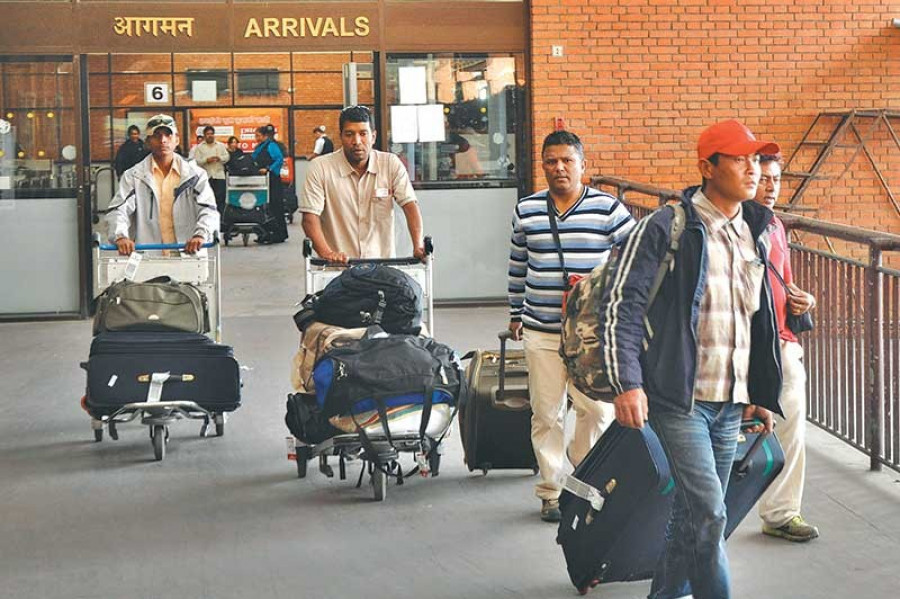Columns
Reintegrating returnee migrant workers
The local level is the fundamental institution to implement reintegration programmes.
Thaneshwar Bhusal
The government of Nepal has recently promulgated a national reintegration framework with clear institutional and procedural outlines to reintegrate returnee migrant workers. The legal basis of this policy framework is the Foreign Employment Act 2007. While the law empowers the Foreign Employment Board to carry out welfare services, the reintegration policy expands the scope of welfare services across federal, provincial and local jurisdictions. In other words, federalism has been adequately captured by the policy, though there remain uncertainties with regard to financial collaboration across federal units.
The generic layout of the policy is as such. It has three key dimensions: employment, entrepreneurial and social. The employment dimension envisions that returnee migrants acquire some form of skills which could be useful to Nepal’s employers. Employers in the national landscape are expected to hire those returnees who bring useful skills from overseas employment. The entrepreneurial dimension encourages returnee migrant workers to establish small-scale enterprises to which governments at different levels could provide motivational support such as concessional loans, discounts on the purchase of technological equipment and subsidies on taxes. The social dimension of the policy recognises that not all returnee migrants bring wealth or skills. It is evident that some migrant workers get involved in workplace or road accidents resulting in permanent disabilities, others face wage thefts, and a tiny group of migrants cannot save money before returning home.
Institutional devices
Two institutional devices could be considered instrumental in the implementation of this policy. The "direction committee" at the federal level is led by the executive director of the Foreign Employment Board which seeks to coordinate all reintegration programmes in the country with the sole hope of (i) Eliminating overlaps across programmes, (ii) Keeping real-time database of reintegration programmes, and (iii) Conducting proper monitoring and evaluation of the programmes. The "management committee" at the local level is led by the deputy mayor in urban municipalities and vice-chair in rural municipalities which aims to manage the actual implementation of reintegration programmes regardless of diverse funding sources, size, modality and collaboration. Although there seems to be a lack of any similar committee at the provincial level in the policy, both the direction and management committees are expected to coordinate with the provincial governments to ensure proper coordination in the design and delivery of reintegration services to returnee migrant workers.
The role of the Ministry of Labour, Employment and Social Security is envisaged to be crucial in managing foreign aid, and or handling mega-projects that aim to serve returnee migrant workers. Although the ministry has to follow the prevailing foreign aid policy of the government of Nepal, it has the responsibility to specify priority areas, modalities and monitoring and evaluation mechanisms to make sure the aid is effectively utilised. The constitution and relevant laws exclusively provide a basis for the Labour Ministry to lead the foreign employment regime, hence handling reintegration programmes lies, in principle, within its jurisdiction. The policy foresees that any donor agency willing to carry out reintegration programmes in the country will need to approach the ministry as the entry point. The next step is that the ministry liaisons with the concerned ministries and entities such as the Ministry of Finance to get approval for the acceptance of programme items and the budget. The approved donor-funded projects then need to coordinate with the "direction committee" at the Foreign Employment Board before they begin the implementation of their projects.
Local NGOs are also given ample opportunities to participate in the implementation of the reintegration programmes. As with other programmes, they must comply with other legislative requirements to operate in any locality. Depending upon their funding size, conditions and structure, local NGOs are assisted by the local "management committee" in designing the reintegration programmes. Moreover, the policy provides avenues for civil society organisations and the private sector to engage in supporting returnee migrant workers, given that they are recognised by their local management committee.
The policy alone can never be a game changer to transform the lives of returnee migrant workers because several ecological factors play instrumental roles. This indicates that local management committees must be deeply engaged in identifying returnee migrant workers, their interests and skills to be reintegrated, and the amount of money they can invest in entrepreneurial activities. In doing so, the policy requires all municipalities to keep an actual record of returnee migrant workers which is supported by the Foreign Employment Board through the deployment of volunteers at the arrival lounge of international airports. The database maintained by the Department of Foreign Employment, therefore, needs to be expanded to municipalities, at least in its readable format.
Foreign aid
While the policy is vocal in accepting foreign aid to run the reintegration programmes, there remains several ambiguities. Foremost among them is the notion of aid that is available in many labour receiving countries. The policy is inadequate in pushing the government to have a conversation with labour receiving countries to bring funds to run reintegration programmes, though evidence suggests that some countries such as Japan and Korea are willing to carry out targeted reintegration programmes in Nepal. It is, therefore, hoped that the policy will provide a benchmark in the future to help support returnee migrant workers whose contribution to Nepal’s economic development is unparalleled.
A few policy recommendations seem crucial. First, the reintegration policy should not be considered as the policy of the Labour Ministry only. It captures both horizontal and vertical institutions of the government, hence all federal units should consider the policy as their own. Second, it envisages incorporating non-governmental actors and the private sector to, particularly, engage in offering employment opportunities to returnees, entrepreneurial prerequisites to aspirant entrepreneurs, and skills and knowledge sharing avenues for policymakers. And the third is the role of local governments. The policy is vocal in making Nepal’s local governments more responsible than any other level of government. The local level committee chaired by the deputy mayor or vice-mayor is the fundamental institution to implement returnee migrant-focused programmes. The committee enjoys the power and resources to authorise reintegration programmes in their localities. Without proper realisation of these peculiarities at the federal, provincial and local levels, the policy may not achieve its inherent objectives.




 21.12°C Kathmandu
21.12°C Kathmandu















